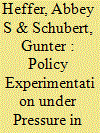| Srl | Item |
| 1 |
ID:
167071


|
|
|
|
|
| Summary/Abstract |
Policy entrepreneurs play a pivotal role in policy changes in both electoral democracies and authoritarian systems. By investigating the case of healthcare reform in Sanming City, this article illustrates how the fragmented bureaucracy in China enables and constrains local policy entrepreneurs, and how entrepreneurial manoeuvring succeeds in realigning the old institutional structures while attacking the vested interests. Both structural conditions and individual attributes are of critical importance to the success of policy entrepreneurship. Four factors and their dynamic interactions are central to local policy entrepreneurship: behavioural traits, political capital, network position and institutional framework. This study furthers theoretical discussion on policy entrepreneurship by elucidating the fluidity of interactional patterns between agent and structure in authoritarian China. The malleability of rigid institutions can be considerably increased by the active manoeuvring of entrepreneurial agents.
|
|
|
|
|
|
|
|
|
|
|
|
|
|
|
|
| 2 |
ID:
190404


|
|
|
|
|
| Summary/Abstract |
Many studies put forward the argument that local policy experimentation, a key feature of China's policy process in the Hu Jintao era, has been paralysed by Xi Jinping's (re)centralization of political power – otherwise known as “top-level design.” This narrative suggests that local policymakers have become increasingly risk-averse owing to the anti-corruption campaign and are therefore unwilling to experiment. This article, however, argues that local governments are still expected to innovate with new policy solutions and now will be punished if they do not. By introducing the analytical framework of “experimentation under pressure” and drawing on an analysis of over 3,000 local government regulations and fieldwork data related to foreign investment attraction policies in two localities, Foshan and Ganzhou, the authors highlight new features developing within current experimental policy cycles. Local cadres now have no choice but to experiment as the political risk of shirking the direct command to experiment may be higher than the inherent risk of experimentation itself.
|
|
|
|
|
|
|
|
|
|
|
|
|
|
|
|